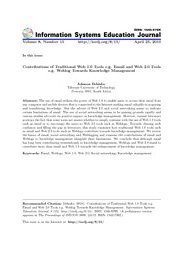Volume 8
Volume 8, Number 15 |
April 23, 2010 |
Abstract: The use of email utilizes the power of Web 1.0 to enable users to access their email from any computer and mobile devices that is connected to the Internet making email valuable in acquiring and transferring knowledge. But the advent of Web 2.0 and social networking seems to indicate certain limitations of email. The use of social networking seems to be gaining grounds rapidly and various studies advocate its positive impact on knowledge management. However, current literature portrays the fact that some users are unsure whether to simply continue with the use of Web 1.0 tools such as email or to encourage the move to Web 2.0 tools such as Weblogs. Towards clearing such confusion and filling the gap in literature, this study examines how traditional Web 1.0 tools such as email and Web 2.0 tools such as Weblogs contribute towards knowledge management. We review the basics of email, social networking and Weblogging and examine the contributions of email and Weblogs to knowledge management alongside their limitations. We conclude that although email has long been contributing tremendously to knowledge management, Weblogs and Web 2.0 stand to contribute more than email and Web 1.0 towards the enhancement of knowledge management.
Keywords: Email, Weblogs, Web 1.0, Web 2.0, Social networking, Knowledge management
Download this issue: ISEDJ.8(15).Dehinbo.pdf (Adobe PDF, 13 pages, 607 K bytes)
Preview the contents: Dehinbo.j.txt (ASCII txt, 39 K bytes)
Recommended Citation: Dehinbo (2010). Contributions of Traditional Web 1.0 Tools e.g. Email and Web 2.0 Tools e.g. Weblog Towards Knowledge Management. Information Systems Education Journal, 8 (15). http://isedj.org/8/15/. ISSN: 1545-679X. (A preliminary version appears in The Proceedings of ISECON 2008: §5112. ISSN: 1542-7382.)
